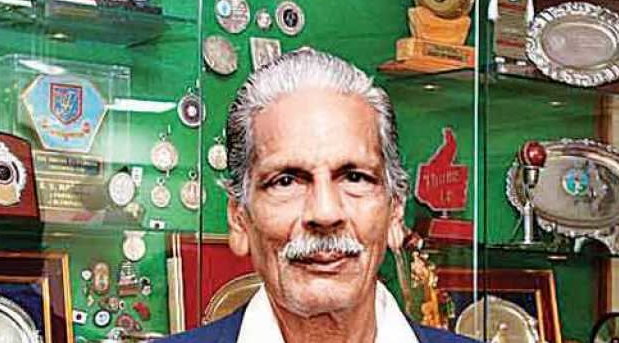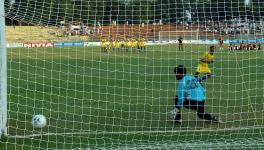Obituary: Shankar Subramaniam “Babu” Narayan - A Football Farewell

Originally from Palakkad, Kerala, SS Babu Narayan learned the nuances of goalkeeping in Mumbai and rose to become a part of the Indian football team for nearly 10 years. Between 1956 and 1964, he rarely got dropped from the national team.
In February 2009, the union sports ministry decided to felicitate the surviving members of the 1956 Melbourne Olympics Indian football team, who finished fourth in the competition.
The function held at the India International Centre (IIC) in Delhi had everything going smooth till the time the minister-in-charge rose to speak. While describing how the 1956 India team routed hosts Australia on their home turf, he suggested the current Indian national team might end up losing to an Australian schools team.
It was a comment certainly made on a lighter note though not exactly in good taste. Most of the people in the small gathering laughed as the minister said it. With one exception. Two-time Olympian goalkeeper Shankar Subramaniam “Babu” Narayan kept sitting at the front row with an impassive face. He was hardly impressed and made no effort to hide it.
Also Read | The Pain Of Bajrang Punia in His Quest for Olympic Success
Once the function was over, Narayan, more famous as Babu, told this correspondent how disappointed he was with the minister. “The comment was totally unwarranted. I hate to demean the present generation of footballers. They are as good or as bad like we used to be,” he said.
Those who knew Babu, who passed away in Mumbai on Thursday, August 5, at the age of 86, would hardly be surprised by his reactions. In the Indian football circuit, Babu would often be described as a “classy person”, whose dignified manners always made people treat him with respect. Gentle and soft spoken, he was best described by former Maharashtra striker and reputed coach Harish Rao. “On the pitch, Babu was simply a legend in Mumbai. Off the ground, he was knowledgeable and always spoke sense.”
As a player, Babu has his place assured in the history of Indian football. When he played in the 1950s and 60s, football was at the height of its popularity in India. The competition was tough as the domestic circuit was flooded with quality players from Calcutta, Hyderabad, Bangalore, Bombay and other states. India were regarded as one of the best in Asia. It wasn’t easy to find a place in the national team.
Originally from Palakkad, Kerala, lanky Babu learned his game in Mumbai and rose to become a part of the national team for nearly 10 years. Between 1956 and 1964, he rarely got dropped from the national team. He had some important mementos in his trophy cabinet – it includes the 1956 Olympic fourth place and the runners-up trophies from 1961 Merdeka and 1964 Asian Cup in Tel Aviv.
Also Read | Tears of Hope, Screams of Justice: This Indian Women’s Hockey Team Inspires Us to Change; It’s Time We Did
Now, almost 60 years later, it’s hard to imagine how creditable it was for Babu Narayan to hold on to his place in the national team for such a long period despite stiff competitions. There was no dearth of good goalkeepers in the country – Sanat Sett, Peter Thangaraj, Prodyut Burman, C. Mustafa were all vying for a place in the national team with eye-catching performances at the domestic level. Yet, Thangaraj and Babu were natural choices on most occasions.
True, Babu had to play the second fiddle in the national team on most occasions because of Thangaraj’s presence though he had his opportunities in some crucial matches, where he displayed his class. Otherwise, he wouldn’t have been coach SA Rahim’s choice in two back to back Olympics in Melbourne and Rome.
Defender Arun Ghosh, a member of the 1962 Asian Games gold winning team, considers Babu Narayan a hugely competent custodian. “Yes, most of the time Thangaraj was the first choice goalkeeper ahead of Babu, but in my opinion, Babu was technically a shade better. He had some qualities, which no one in India had. But then, how can you drop Thangaraj? On his day, he was Asia’s best.”
Sukumar Samajpati, a member of the 1964 Asia Cup team, said he was great fan of Babu because of his sense of involvement and fellow-feeling. “I suspect sometimes Babu felt sad that he didn’t receive his due. But he was too dignified to utter anything publicly.
Also Read | On for the Gold Quest: The Big Stakes in Indian Women’s Hockey Team’s Tokyo Show
“Otherwise, Babu was an extremely jovial character. In the 1964 Asia Cup in Tel Aviv, a local young man and a young lady was attached to our team as interpreters and guides. I remember Babu became their favourite player because of his simple behaviour and friendly nature. Sitting in the last row of seats in the team bus, Babu would continuously crack jokes at others. It was always a pleasure to have a player like Babu in the team,” Samajpati remembered.
It would be foolish to assume Babu didn’t understand the complexities of Indian football scenario. Many years later, he would describe to this correspondent the politics of team selection those days and how the quota system played a dominant role in it.
Having an educated and analytical mind was Babu’s biggest asset. He knew that coach Rahim, despite his legendary status, had his weaknesses that at times cost Mumbai footballers dear. But never for a minute could he be dragged into a conversation comparing Thangaraj with himself. “Peter was by far the best,” would be his reply.
One thing, however, he could never forget — the denial of captaincy to his Caltex Club teammate and defender Latif for the 1960 Rome Olympics. “Latif was the captain in the pre-Olympics. He would have been the natural choice for Rome. Instead he was replaced.
Click | For More Coverage of the Tokyo Olympics From Newsclick Sports
“Latif was a handsome man, we used to call him “Colonel”. I know how deeply hurt he was by the federation’s decision. He migrated to Pakistan later. I couldn’t help but to support him. I was disgusted with the way he was treated,” Babu once told this reporter.
Was the backroom politics of Indian football was a reason he chose not to indulge in soccer administration after retiring from the game? One is not sure. But he never backed out when his advices were sought.
One of the biggest heroes of Cooperage after Independence as he played for Indian Gymkhana, Matunga Sports Club, Caltex Club and Tata Sports, Babu is a product of Mumbai football, which, over the years, has produced an array of top goalkeepers. Starting from Sanjeeva Uchil, Babu Narayan, Bandya Kakade, Henry Menezes, Abdul Qadir, Yusuf Ansari and many others, the list was long.
“Babu began his career from Indian Gymkhana. I am also a product of the same club many years later. We improved because we played football across the year, at least 50 to 60 matches a season. It doesn’t happen these days,” rued former India goalkeeper Menezes.
SS Babu Narayan was a double Olympian, a huge achievement by any standard. He died in the midst of Tokyo Olympics, when the prime minister said India were proud of its players after India lost to Belgium in hockey. Babu might not have been remembered by many but he too is a story in India’s Olympic history.
Get the latest reports & analysis with people's perspective on Protests, movements & deep analytical videos, discussions of the current affairs in your Telegram app. Subscribe to NewsClick's Telegram channel & get Real-Time updates on stories, as they get published on our website.
























